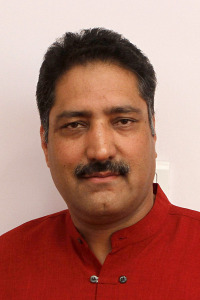
Indian journalist and trade unionist Sabina Inderjit and others at the conference. Photo: Beena Sarwar
After I attended a media conference in Poland in June last year where I also presented a paper on digital and traditional media, an old friend and colleague from Lahore asked me to write a short report about it for his media outlet Dispatch News Desk. Shared below, belatedly, on the occasion of World Press Freedom Day. p.s. DND, which has a presence in Central Asia, also published the report in Russian.
Journalists at media conference vow to uphold journalistic values and ethics
By Beena Sarwar

Journalists and media practitioners from UK, South Africa, Poland, India, and Lebanon at a panel: Faustina Starrett, Mondli Makhanya, Paweł Bobołowicz, Sanjoy Hazarika, and Vanessa Bassil. Photo: Beena Sarwar
Besides the host country Poland, participants hailed from countries around the world including Lebanon, USA, UK, South Africa, India, Pakistan, Germany, Holland, Ireland, Estonia, Ukraine and Russia — newspaper, television and radio reporters, editors and producers, journalism teachers and trainers, trade union members, data analysts, media monitoring experts, and activists engaged with the media in some way or other.
There were thought-provoking presentations at panel discussions about issues like dignity of the media, the role of public, private and citizen media, digital and traditional media, role of the media in democracy, at times of conflicts and in understanding “the other”.
A panel addressing the issue of freedom of the Polish media featured presentations by senior Polish journalists. Each of them affirmed that, contrary to reports by the western media as well as NGOs like Committee to Protect Journalists and Freedom House, the media in Poland are free and face no threats except for market forces and the Internet that pose a challenge to traditional media around the world.
Participants from Ukraine, Pakistan, India shared information about the unprecedented censorship and self-censorship in their countries. From South Africa came stories about the challenges building democracy in a polarized society.
A former militia member from Lebanon shared his powerful and moving story of going from violence to peacebuilding. “I have blood on my hands,” he said, talking about his years-long process of overcoming long-held prejudices and indoctrination.
The media “were definitely one of the factors” contributing to his earlier beliefs, he said, pleading with the journalists present to use their positions to avoid sensationalizing, stereotyping and ‘othering’.
There were plenty of disagreements between the participants on the panels as well as in the audience. Intense discussions following the presentations also became heated at times.
Overall however, participants were in broad agreement about the importance of the news media in strengthening democracy. They also shared similar concerns about major challenges journalism faces in one form or another in various societies.
The conference declaration drafted at the end of the two-day event reaffirmed participants’ commitment to journalistic ethics and values, as well as their pledge to stand firm against challenges from violence, threats and commercial pressures, as well as false information that spreads fast in the digital age.
Participants agreed on the need to uphold journalistic basics and media ethics, like providing full and complete information and context, obtaining multiple sources of verification, and monitoring power.
They also agreed that it is essential to provide training to new journalists including non-professionals and citizen journalists, besides refresher courses to practicing journalists to avoid falling into the traps of click baiting and scoops that contain unverified news.
Besides journalists, training for readers would also be useful to recognize the difference between journalism and sensationalism, whether it is objectivity of facts or pluralism of opinion.
Noting that the explosion of information means that the role of journalists is more important than ever, participants committed to being self-reflective, offering context and deepening understanding and tolerance, besides using their positions to “build bridges rather than deepen conflicts”.
Conference participants in their declaration also strongly condemned the assassination of their colleague Shujaat Bukhari, Editor of Rising Kashmir, shot dead in Srinagar on June 14. The target killing, they said “highlights the nature of these threats from multiple sources. We stand together in condemning his murder in the strongest of terms and join our colleagues worldwide in demanding a proper and credible investigation into his murder that ensures his killers are brought to justice.”
(ends)
Filed under: Uncategorized | Tagged: Estonia, Germany, Holland, India, Ireland, journalists, Lebanon, Pakistan, poland, press freedom, Rising Kashmir, Russia, Shujaat Bukhari, South Africa, threats to journalists, UK, Ukraine, usa |




Press freedom mean not indulge in political institutions and not deforming politicine personalities.Their working attach with political institutions strong.If political institutions get weak your profession get also weak.When you play the role as king maker then the journalism converted into yellow media stand on lies.Always blameing political institutions to wellcome dictatorship but never say how political parties get weak to stand front of diictators and how when press.and media jump first sing songs to wellcome.Black out for coverage of political activists.Suppose PPP a political parties. Given democratic Constitution when division down through defameing the paties in their down fall media plays partner making pro political parties standing like JM L then NML in front of media and press knows each and every wrong doing.But singing songs to Weak PPP..That time.you information are reliable but very lies song and antippp movement.PPP come weak day by day to work for democracy to make strong but press never enlighten this weak institutions.This going for.last.forty years.Political activist Benezeer had her.own.strugle to.stand Martal laws wrong doing.
LikeLike